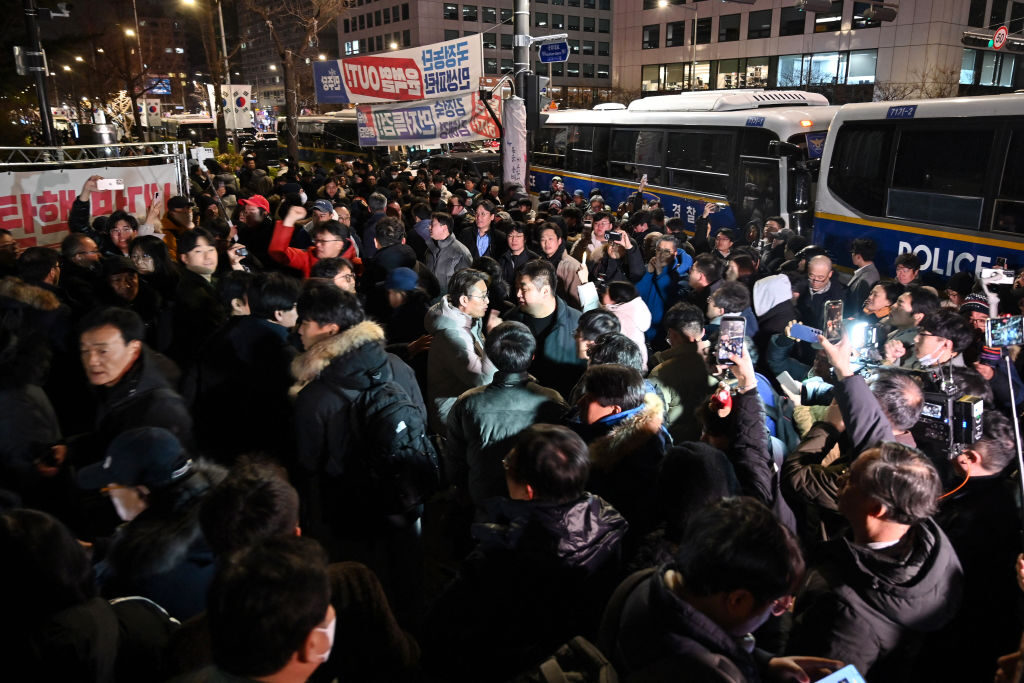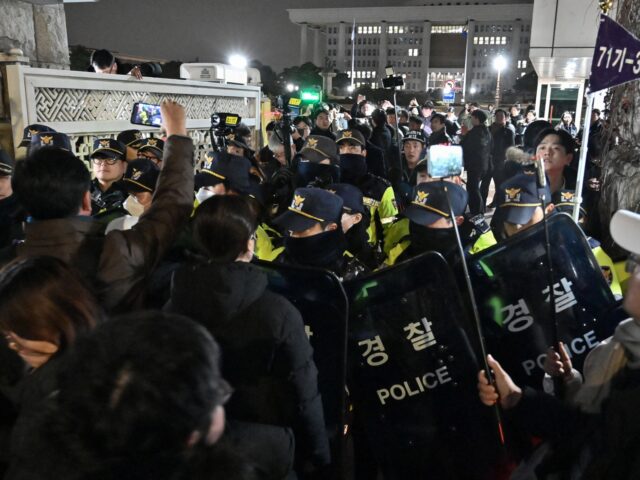South Korean Yoon Suk-yeol stunned the world on Tuesday morning by declaring a state of “emergency martial law” because “subversive, anti-state elements” among the opposition are blocking his agenda.
Martial law has not been declared in South Korea since it emerged from military dictatorship in the 1980s.
“I declare martial law to protect the Republic of Korea from the threats of North Korean communist forces, to immediately eradicate the unscrupulous pro-Pyongyang anti-state forces that pillage the freedom and happiness of our people and to protect free constitutional order,” Yoon said in an emergency press conference from his office in Seoul.
Yoon accused the opposition of “paralyzing the courts in the country by threatening the judges and impeaching prosecutors, and by attempting to remove the Interior Minister, top broadcasting regulator, chief of the Board of Audit and Inspection, and the Defense Minister.”
Yoon also said the opposition’s move to cut $2.8 billion from the $483 billion 2025 national budget was a scheme to paralyze his government. The opposition wants to deny extra spending for the presidential office, prosecutors, and police requested in Yoon’s budget.
The president’s supporters say one reason for these cuts is to undermine court cases against opposition leader Lee Jae-myung, who was convicted of election law violations last month. Yoon referred to the National Assembly, where Lee’s Democratic Party holds 170 out of 300 seats, as a “hotbed of criminals” in his declaration of martial law.
On Monday, the speaker of parliament froze voting on the budget until December 10.
Yoon said on Tuesday that martial law would remain in effect until he could “eradicate such anti-state forces and the culprits of the country’s ruin who have committed evil acts up until now.”
“The declaration of martial law will cause some inconveniences for good citizens who believed in and followed the constitutional values of free people, but we will focus on minimizing such inconveniences,” he said.
Yoon said these inconveniences were necessary to “guarantee the people’s freedom, safety and national sustainability against the actions of anti-state forces seeking to overthrow the system.”
“I will wipe out anti-state forces as soon as possible and normalize the country’s operation,” he promised. “Please trust me.”
The South Korean Defense Ministry announced that key commanders from all of South Korea’s armed forces met to “strengthen emergency preparedness” and discuss implementation of Yoon’s order.

People gather in front of the National Assembly in Seoul, South Korea on December 4, 2024, after President Yoon Suk Yeol declared emergency martial law. (JUNG YEON-JE/AFP via Getty)
The South Korean opposition was, unsurprisingly, opposed to Yoon’s declaration of martial law, but so was Han Dong-hoon, the leader of Yoon’s People Power Party. Han issued a statement on Tuesday that said he would “oppose the declaration of martial law alongside the people.”
“The President’s declaration of martial law is wrong,” Han declared.
“There is no reason to declare martial law. We cannot let the military rule this country,” opposition leader Lee said.
“President Yoon Seok Yeol has betrayed the people. President Yoon’s illegal declaration of emergency martial law is null and void. From this moment on, Mr. Yoon is no longer the president of South Korea,” he insisted.
Lee urged the South Korean military not to obey Yoon’s orders any longer.
“Soldiers, the guns and bayonets you have, the power you have, come from the people. The owners of this country are the people. The one you should obey is not Yoon Suk Yeol but the people,” he said.
South Korean media showed protesters attempting to storm the parliament building, which has been locked down under orders from the military.
Yoon himself has been fending off calls for independent investigations into several scandals involving his wife Kim Keon-hee and top officials from his party. Yoon and Kim are accused of interfering in the party’s choice of candidate for a legislative seat in 2022 at the behest of a powerful supporter named Myung Tae-kyun.
Yoon is down to 25% approval in the polls, slipping again last week after a modest recovery in early November. His People Power Party is polling at 32%, while the opposition Democratic Party (DP) sits at 45%.
The imposition of martial law was not a complete surprise, as the DP accused Yoon of plotting to do exactly that in September. The DP said Yoon would impose martial law to prevent the parliament from impeaching him for abuse of power, touching off a storm of angry denials and counter-accusations.
Update: Martial law commander Park An-su issued a statement on Tuesday declaring that “all political activities, including those of the National Assembly, local councils, political parties, and political associations, as well as assemblies and demonstrations, are strictly prohibited.”
“All media and publications shall be subject to the control of the Martial Law Command,” Park added.
The martial law decree also ordered all medical personnel who are on strike, or on leave, to “return to their duties within 48 hours and work faithfully.” All strike activity has been banned for the duration of martial law. A significant number of South Korea’s medical personnel have been on strike since February due to changes in government policies.
Police and military forces have been deployed around the South Korean parliament building, where they are clashing with a large group of angry protesters. DP legislators appear to be resisting efforts by security forces to remove them from the building:
Reuters reported that about 70 opposition legislators have gathered inside the building, and more are attempting to join them. Riot police are preventing either lawmakers or members of the public from entering the facility.

COMMENTS
Please let us know if you're having issues with commenting.